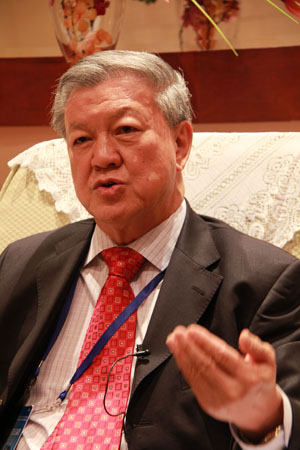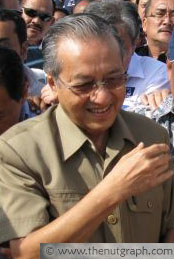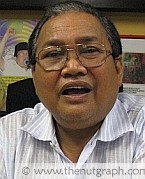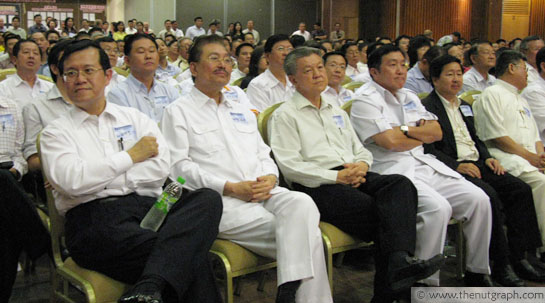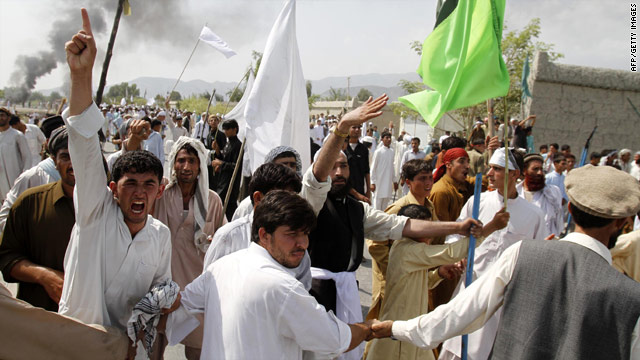By Joe Fernandez - Free Malaysia Today
KOTA KINABALU: Hindraf Makkal Sakthi has challenged Umno to call former prime minister Mahathir’s Mohamad’s bluff on Perkasa, the NGO that claims to be assisting the ruling party to keep its Malay vote bank intact.
Mahathir had claimed that Malay voters would desert Umno without Perkasa which, according to him, has substantial Malay support.
“It’s not true that Umno will be even weaker than it is now without Perkasa as Mahathir claims,” said Hindraf’s London-based chairperson P Waythamoorthy. “Umno will be in even deeper trouble if it continues to associate itself with Perkasa. Already, it has only 35.6% of the parliamentary seats, that is, 79 seats.”
He was speaking with FMT by telephone from London after Mahathir issued a statement implying that Umno needs Perkasa more than the latter needs the former.
Mahathir was flogging the line that “it was more important for Umno to worry about keeping its Malay vote bank intact than place greater emphasis on its relationship with its fellow component parties in the Barisan Nasional (BN) coalition”.
Waythamoorthy noted that Umno was getting increasingly weaker, which is Mahathir’s worry, but not for the reasons that he has trotted out in public. Umno is weak because it not only has no ideology whatsoever but has run foul of Article 153 of the Federal Constitution, said the Hindraf chair, and mismanaged the New Economic Policy (1970-1990), the economy and race relations.
“The Malays themselves have increasingly realised that Umno is not for all of them but just a handful trading on their name,” charged Waythamoorthy. “If Umno has any ideology at all, it’s jealousy of the Chinese in business.”
'Perkasa approach will fail'
Mahathir, said Waythamoorthy, belabours under the misconception that twisting and turning every issue into a racial issue will scare the Malays into circling the wagons under a common platform, Umno, against the non-Malays. Such tactics, he surmised, will no longer work after more than half century of independence.
He explained that the Perkasa approach will fail because the Malays will no longer be used again by the ruling elite for their own self-serving agenda, the passage of time has matured Malay politics, the Malays are too large a community to root for one political platform, the opposition is now Malay-led and increasingly better organised, and the alternative media has broken the stranglehold of the mainstream media on public thinking.
“Perkasa and Mahathir are dated. Umno should reject both in no uncertain terms as history and go back to the drawing board if it wants to remain relevant,” said Waythamoorthy. “But that doesn’t mean that Umno needs the BN component parties more than ever.”
Asked to elaborate on his statement, the Hindraf chief stressed that Umno must drop the fiction that the ruling coalition represents the democratic will of the people.
“BN was something that happened in the wake of the May 13, 1969 riots when non-Malay leaders decided to sue for peace with the ruling Malay elite at the expense of all Malaysians,” said Waythamoorthy. “It’s not a democratic set-up at all and should be discarded.”
The BN concept, said Waythamoorthy, circumscribed the democratic process by endorsing elite power-sharing and tacitly denying the grassroots majority meaningful participation in the electoral process.
The Hindraf chair’s main concern with Umno is that it may not give up power even if it’s defeated at the next general election. To prevent this distinct possibility, he urges the ruling party to re-invent itself “to ease itself eventually out of power gracefully and become a loyal opposition”.
Waythamoorthy sees the need for Umno to get away from the BN coalition which he describes as saddled with mere passengers like the MIC and MCA, among others. Instead, he urged Umno to leave the BN coalition and open its doors to Indian and Chinese membership in particular in Peninsular Malaysia and withdraw from Sabah.
“It’s time for Umno to get away from discredited race-based policies and politics and emerge as a truly multiracial platform as envisaged rightly by founding father Onn Jaafar,” said Waythamoorthy. “This is one of the two paths to political salvation for Umno.”
The other path, said Waythamoorthy, is for Umno to weed out the distortions and deviations in the implementation of Article 153 and the NEP.
Dustbin of history
The NEP, which takes its inspiration from Article 153, pledged the elimination of poverty irrespective of race, religion, class and colour, he pointed out. “It also pledged to eliminate the identification of race with economic function and place of residence.”
On Bumiputera equity, the Hindraf chief reminded that it was not meant to be a sapu bersih (clean sweep) of the entire economy but merely confined to a 30% stake in the corporate economy, that is, companies listed on the local stock exchange.
Likewise, Article 153 is not another sapu bersih clause in the Federal Constitution, argued Waythamoorthy, but one that provides for a reasonable proportion for the Malays and Natives in four areas, namely intake into the civil service; intake into institutions of higher learning owned by the government and special training privileges; government scholarships; and business opportunities created by the government.
“This is the special position recognised by the Federal Constitution for the Malays and Natives but they were only supposed to last 15 years after independence,” said Waythamoorthy. “The Federal Constitution makes no mention of special privileges for the Malays and Natives.”
Umno, said Waythamoorthy, should stop harping on the so-called special privileges – Perkasa’s constituency -- and seek a way out of its current political dilemma or be consigned into the dustbin of history.
KOTA KINABALU: Hindraf Makkal Sakthi has challenged Umno to call former prime minister Mahathir’s Mohamad’s bluff on Perkasa, the NGO that claims to be assisting the ruling party to keep its Malay vote bank intact.
Mahathir had claimed that Malay voters would desert Umno without Perkasa which, according to him, has substantial Malay support.
“It’s not true that Umno will be even weaker than it is now without Perkasa as Mahathir claims,” said Hindraf’s London-based chairperson P Waythamoorthy. “Umno will be in even deeper trouble if it continues to associate itself with Perkasa. Already, it has only 35.6% of the parliamentary seats, that is, 79 seats.”
He was speaking with FMT by telephone from London after Mahathir issued a statement implying that Umno needs Perkasa more than the latter needs the former.
Mahathir was flogging the line that “it was more important for Umno to worry about keeping its Malay vote bank intact than place greater emphasis on its relationship with its fellow component parties in the Barisan Nasional (BN) coalition”.
Waythamoorthy noted that Umno was getting increasingly weaker, which is Mahathir’s worry, but not for the reasons that he has trotted out in public. Umno is weak because it not only has no ideology whatsoever but has run foul of Article 153 of the Federal Constitution, said the Hindraf chair, and mismanaged the New Economic Policy (1970-1990), the economy and race relations.
“The Malays themselves have increasingly realised that Umno is not for all of them but just a handful trading on their name,” charged Waythamoorthy. “If Umno has any ideology at all, it’s jealousy of the Chinese in business.”
'Perkasa approach will fail'
Mahathir, said Waythamoorthy, belabours under the misconception that twisting and turning every issue into a racial issue will scare the Malays into circling the wagons under a common platform, Umno, against the non-Malays. Such tactics, he surmised, will no longer work after more than half century of independence.
He explained that the Perkasa approach will fail because the Malays will no longer be used again by the ruling elite for their own self-serving agenda, the passage of time has matured Malay politics, the Malays are too large a community to root for one political platform, the opposition is now Malay-led and increasingly better organised, and the alternative media has broken the stranglehold of the mainstream media on public thinking.
“Perkasa and Mahathir are dated. Umno should reject both in no uncertain terms as history and go back to the drawing board if it wants to remain relevant,” said Waythamoorthy. “But that doesn’t mean that Umno needs the BN component parties more than ever.”
Asked to elaborate on his statement, the Hindraf chief stressed that Umno must drop the fiction that the ruling coalition represents the democratic will of the people.
“BN was something that happened in the wake of the May 13, 1969 riots when non-Malay leaders decided to sue for peace with the ruling Malay elite at the expense of all Malaysians,” said Waythamoorthy. “It’s not a democratic set-up at all and should be discarded.”
The BN concept, said Waythamoorthy, circumscribed the democratic process by endorsing elite power-sharing and tacitly denying the grassroots majority meaningful participation in the electoral process.
The Hindraf chair’s main concern with Umno is that it may not give up power even if it’s defeated at the next general election. To prevent this distinct possibility, he urges the ruling party to re-invent itself “to ease itself eventually out of power gracefully and become a loyal opposition”.
Waythamoorthy sees the need for Umno to get away from the BN coalition which he describes as saddled with mere passengers like the MIC and MCA, among others. Instead, he urged Umno to leave the BN coalition and open its doors to Indian and Chinese membership in particular in Peninsular Malaysia and withdraw from Sabah.
“It’s time for Umno to get away from discredited race-based policies and politics and emerge as a truly multiracial platform as envisaged rightly by founding father Onn Jaafar,” said Waythamoorthy. “This is one of the two paths to political salvation for Umno.”
The other path, said Waythamoorthy, is for Umno to weed out the distortions and deviations in the implementation of Article 153 and the NEP.
Dustbin of history
The NEP, which takes its inspiration from Article 153, pledged the elimination of poverty irrespective of race, religion, class and colour, he pointed out. “It also pledged to eliminate the identification of race with economic function and place of residence.”
On Bumiputera equity, the Hindraf chief reminded that it was not meant to be a sapu bersih (clean sweep) of the entire economy but merely confined to a 30% stake in the corporate economy, that is, companies listed on the local stock exchange.
Likewise, Article 153 is not another sapu bersih clause in the Federal Constitution, argued Waythamoorthy, but one that provides for a reasonable proportion for the Malays and Natives in four areas, namely intake into the civil service; intake into institutions of higher learning owned by the government and special training privileges; government scholarships; and business opportunities created by the government.
“This is the special position recognised by the Federal Constitution for the Malays and Natives but they were only supposed to last 15 years after independence,” said Waythamoorthy. “The Federal Constitution makes no mention of special privileges for the Malays and Natives.”
Umno, said Waythamoorthy, should stop harping on the so-called special privileges – Perkasa’s constituency -- and seek a way out of its current political dilemma or be consigned into the dustbin of history.


 Visvanathan (left) added that the police officers involved in the case had failed in carrying out their duties, accusing them of refusing to act on information that they gathered from witnesses' statements.
Visvanathan (left) added that the police officers involved in the case had failed in carrying out their duties, accusing them of refusing to act on information that they gathered from witnesses' statements.







